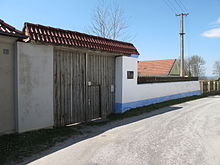Eleonora Ehrenberg

Eleonora Gayer Freiin von Ehrenberg , Czech Eleonora Ehrenbergová , Eleonora Ehrenbergerová or Eleonora Gayerová z Ehrenbergů (born November 1, 1832 in Modrá Hůrka ; † August 30, 1912 in Ondřejov ) was a Bohemian opera singer (coloratura soprano). She began her career in German opera and sang in the Czech opera from 1864.
Life
Eleonora Ehrenberg came from a noble family impoverished during the Napoleonic Wars. Her great-grandfather was the Prague pharmacist Anton Franz Gayer, who was elevated to the nobility by Maria Theresa in 1764 because of his services in the Seven Years' War with the title of Ehrenberg . Her father Johann Aloys Gayer von Ehrenberg was councilor at the royal Bohemian appellate and criminal court and was raised to the baron status in 1818. Eleonora Ehrenberg came from the second marriage of her father, who died in 1833, and was born in house no. 14 in Modrá Hůrka. After her mother's death, she grew up in the Ursuline Convent in Prague from 1842 to 1847, where she received her first musical training. She then lived in Vienna with her aunt, Countess Herzan von Harras until 1852 , and received piano lessons. Between 1852 and 1854 Eleonora von Ehrenberg studied harmony and counterpoint at the Prague Conservatory with Johann Friedrich Kittl and also received vocal training from Giovanni Battista Gordigiani .
She made her debut on August 3, 1854 at the Estates Theater under the direction of František Škroup in the title role of the opera The Bride of Lammermoor . Eight days later she sang Adina in The Love Potion there . Through the mediation of Heinrich Marr , she received an engagement at the Stettin Opera House from 1854 to 1856 , where she embodied Giulietta in Die Capulets and Montague , among others . In 1856 she made guest appearances in Munich and Prague as Lady Harriet ( Martha ). In Prague in the same year she also sang the roles of Marguerite de Valois ( Die Huguenots ), Eudoxie ( Die Jüdin ), Mathilde ( Wilhelm Tell ) and Elvira ( Die Mute von Portici ). From 1856 she was engaged at the Hamburg Opera and then from 1858 to 1861 at the Leipzig Opera House. She then returned to Prague and sang in German productions at the Estates Theater as well as in Czech-language performances in the Neustädter Theater (Novomestské divadlo). At the opening of the Czech Prozatímní divadlo, she sang Constanze in Cherubinis Vodař ( The Water Carrier ) on November 30, 1862, and was hired there in 1863 for a high annual salary of 3000 guilders. In 1864 Eleonora Ehrenberg decided entirely for the Czech opera, where she was unrivaled in the coloratura field, while according to her own statement she competed with Johanna Brenner at the German opera. It stayed that way in the following years, only with Marie Petzoldová-Sittová did the Czech opera receive another great coloratura part. According to her records, her repertoire comprised 132 roles and she had 1750 appearances.
On December 28, 1864 she sang the duet of Ludiše and Tausendmark from Smetana's unplayed opera Braniboři v Čechách with Jakub Schwarz . Her roles were initially praised by the music critic of the newspaper Národní listy, Bedřich Smetana , but later he also found criticism in them. She sang Mařenka at the premiere of Smetana's Prodané nevěstě (The Bartered Bride) in 1866. When Smetana took over the position of Kapellmeister at the Prozatímní divadlo in 1866, Eleonora Ehrenberg did not extend her contract, but was re-engaged a year later. In 1868 she sang the role of Jitka at the premiere of Dalibor . In 1876 she resigned because she disliked the fact that the theater was run by young Czechs after Smetana's retreat. Two years later she got involved again and until 1885 belonged continuously to the ensemble of the Prozatímní divadlo and the resulting Národní divadlo . On April 29, 1885 she gave her farewell performance with Leonora from The Troubadour after 30 years on the stage; the same part had also been her first at the Czech opera. She then performed as a concert soprano.
On the occasion of the 500th performance of The Bartered Bride, Eleonora Ehrenberg was made an honorary member of the National Theater on August 8, 1909. Ehrenberg and her niece Marie spent their twilight years in their villa Leonora at the foot of the Žalov hill in Ondřejov. There she performed at private music evenings as a guest of Josef Jan Frič in the Ondřejov observatory .
She found her final resting place in the Ondřejov cemetery opposite the entrance gate.
literature
- Ehrenbergová, Eleonora . In: Large song dictionary . 2000, p. 6722
Web links
| personal data | |
|---|---|
| SURNAME | Ehrenberg, Eleonora |
| ALTERNATIVE NAMES | Ehrenberg, Eleonora Gayer Freiin von (full name); Ehrenbergová, Eleonora (full name); Ehrenbergerová, Eleonora (full name); Gayerová z Ehrenbergů, Eleonora (full name) |
| BRIEF DESCRIPTION | Bohemian opera singer (coloratura soprano) |
| DATE OF BIRTH | November 1, 1832 |
| PLACE OF BIRTH | Modrá Hůrka |
| DATE OF DEATH | August 30, 1912 |
| Place of death | Ondřejov |
